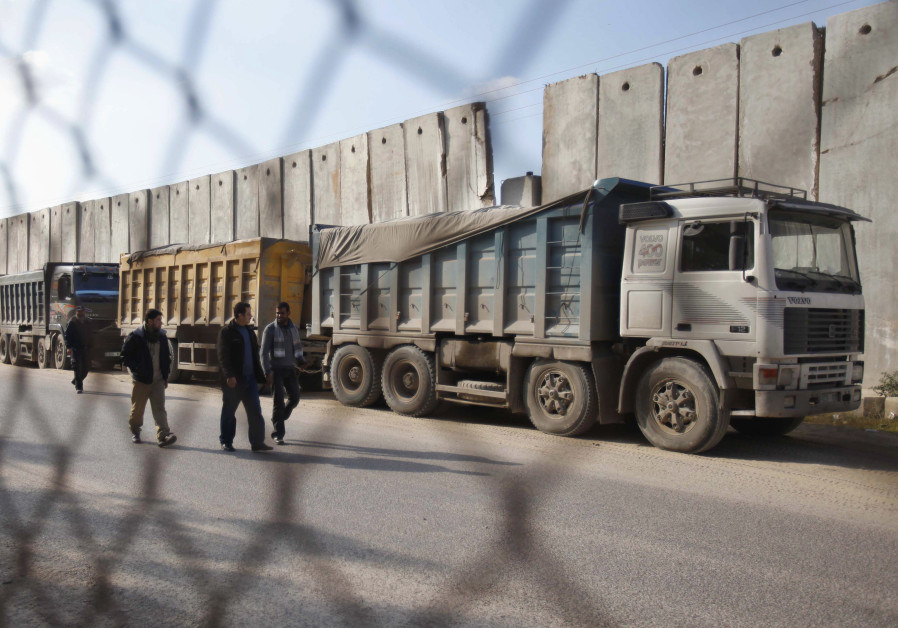Analysis: Why close the Kerem Shalom Gaza border crossing now?

Palestinians walk past trucks loaded with gravel at the Kerem Shalom crossing between Israel and the southern Gaza Strip December 30, 2012.. (photo credit: REUTERS)
Prime Minister Benjamin Netanyahu’s decision on Monday to close the Kerem Shalom crossing to Gaza is the kind of decision that triggers the “why now?” questions.
The violence along the Gaza border has been raging for over three months, beginning with the first “Great March of Return” protest on March 30; peaking with the killing of 62 rioters – including 50 Hamas operatives – on May 14; and then morphing into a wave of flaming balloons and kites that have set fields ablaze adjacent to the Gaza border.
Some – who do not take Netanyahu and Defense Minister Avigdor Liberman at face value when they say that Monday’s decision is a reaction to the flammable kites and balloons – are looking for deeper reasons.
This has led to speculation that this drastic step, closing the main crossing from Israel to Gaza for everything but food and medicine, is a last second negotiating ploy by Israel to gain more concessions from Hamas before some kind of major agreement regarding Gaza – perhaps mediated by Egypt – is rolled out. According to this argument, Israel is simply applying maximum pressure on Hamas before a final push to a secret agreement.
Other speculation links the move to Hamas’s continued rejection of all international efforts for aid, with Hamas spokesmen saying that to accept this aid would be to betray the Palestinian cause and cooperate with Israel the enemy. According to this school of thought, if Israel closes off the Kerem Shalom lifeline, Hamas will have little choice but to accept the international aid offers, or perhaps face the rage of Gaza’s citizens themselves.
And then there is a third school of thought maintaining that – as the saying goes – “sometimes a cigar is just a cigar.”
According to this reasoning, the closure is – as Netanyahu and Liberman maintain – designated to get Hamas to stop sending over the inflammable objects.
The daily arson of Israeli fields over the last three months is beginning to take a toll, as public pressure is mounting on Netanyahu and the army to do something, and more and more voices are being heard arguing that the failure to stop the arson shows that the leadership does not care about what is happening to the southern kibbutzim and moshavim.
As a result of the daily fires and the pressure, the country’s leaders decided to take – as Netanyahu called it – a “significant” step.
Significant, but not too drastic.
The IDF is not keen on starting a war over the flammable flying objects that are burning fields, and Netanyahu also does not want to risk the lives of soldiers fighting in Gaza because of exploding balloons.
So there are a few options. It is possible to threaten Hamas, which both Liberman and Netanyahu have done repeatedly since the wave of kite arson began. But that has not succeeded in getting the terrorist organization to stop setting fire to the Israeli fields.
It is also possible, as both the prime minister and defense minister have done, to stress upon occasion that the real strategic danger to the country – the problem that needs immediate and urgent attention – is Iran’s entrenchment in Syria.
But the public pressure has built nonetheless, and Netanyahu needs to show that not only is Israel not impotent against what seems like a primitive threat, but can also apply pressure on Hamas in return.
Why now? Perhaps because Israel thought, in vain, that its warnings and threats against Hamas would do the trick. Perhaps because they wanted to give Egyptian mediators a chance to persuade Hamas to give up this type of warfare. Perhaps because there was hope the IDF would come up with some kind of technological solution to the problem.
But when none of that came to pass, Netanyahu and Liberman – according to this face-value reading of the situation – decided to turn up the heat, even at the risk of bringing down international condemnation on Israel, and even if it means making the extremely difficult lives of Gaza’s residents under Hamas even more difficult.
Something, Netanyahu and Liberman surely believe, needs to be done.






Comments are closed.